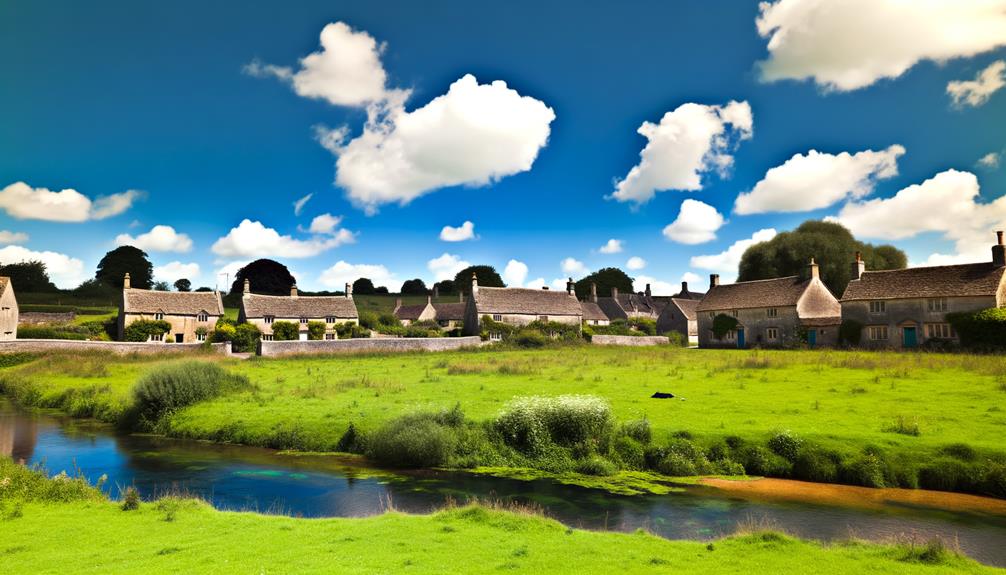Alston Name Meaning and Origin
The name Alston originates from Old English, composed of the elements 'ælf' (elf) and 'tūn' (town), originally referring to a place associated with elves. Documented as early as the 12th century, it was noted for its associations with land ownership and governance, referenced in historical records such as the Domesday Book.
The name saw significant regional influence in counties like Suffolk. Variants like Allston and Elston reflect its adaptability across locales.
Notable bearers include influential figures in politics, academia, and the arts. By exploring further, you will understand its rich historical and cultural impact.

Key Takeaways
- Alston originates from Old English elements 'ælf' and 'tūn', meaning a place associated with elves.
- The name first appeared in 12th-century England and is linked to landownership and governance.
- Joseph Alston and Charles Alston are notable individuals bearing the name, impacting politics and the arts.
- Variants like Allston and Elston reflect regional adaptations and historical dispersion.
- The Alston name is prevalent in England and the U.S., particularly in Suffolk, Durham, and Southern states.
Etymology of Alston
The etymology of the surname Alston reveals its roots in Old English, deriving from the elements 'ælf,' meaning elf, and 'tūn,' meaning settlement or farm.
This linguistic origin suggests that the name likely referred to a place associated with elves, which in Anglo-Saxon culture, were often regarded as supernatural beings with protective qualities.
Over time, the term 'ælftūn' evolved into Alston, reflecting the phonetic and orthographic changes typical of Middle English.
Historical linguists have identified similar patterns in other surnames, indicating a common practice of naming places after mythological entities or natural features.
This etymological analysis underscores the importance of understanding linguistic heritage to fully appreciate the cultural and historical context of surnames.
Early Historical Records
Documented evidence of the surname Alston first appears in 12th-century England, where records indicate its association with landownership and local governance.
Specifically, the Domesday Book, commissioned by William the Conqueror in 1086, references various landholders bearing the name Alston or its variants. These early Alstons were often significant figures within their communities, holding manorial estates and engaging in the administration of local justice.
Parish records and legal documents from the period further corroborate their influential roles. For example, an Alston is documented as a witness to a charter in Suffolk circa 1160.
Such records underscore the surname's longstanding prominence and the socioeconomic stature of its bearers during this formative period in English history.
Alston in Medieval Times
Building upon their early prominence, the Alston family continued to play a significant role in medieval England, particularly in the domains of landownership and governance through the 13th and 14th centuries.
Historical records indicate that members of the Alston family held substantial tracts of land in counties such as Suffolk and Cambridgeshire. Their influence extended into local governance, with several Alstons serving as sheriffs and justices of the peace.
Detailed manorial rolls from this period reveal their involvement in agricultural management and tenant relations, underscoring their economic significance. Additionally, the Alstons' participation in the feudal system often involved military obligations, further embedding them into the societal framework of medieval England.
Their enduring legacy is evidenced through various historical documents.
Geographic Distribution
The geographic distribution of the Alston surname shows significant concentrations in specific areas, especially within England and the United States.
Historical records indicate that migration and settlement patterns, especially during the British colonial era, played a vital role in the spread of the name.
Examination of census data and genealogical studies offers a detailed overview of its regional popularity trends over time.
Regional Popularity Trends
Historically, the surname Alston has shown significant regional concentrations, especially in England and the United States, with notable prevalence in counties such as Suffolk and Durham in England, and states like North Carolina and Virginia in the United States.
In England, the Alston name is documented as early as the 13th century, chiefly in East Anglia, a region known for its agricultural prosperity.
In the United States, the name gained traction in the Southern states during the colonial period, reflecting the migration trends of English settlers.
Census data from the 19th and 20th centuries confirm the sustained presence of the Alston surname in these regions, highlighting its enduring legacy and regional specificity.
Migration and Settlement Patterns
Evidence suggests that the Alston surname's migration and settlement patterns were heavily influenced by socio-economic factors, leading to its widespread geographic distribution across various regions.
Historical records indicate that, during the 17th and 18th centuries, many Alstons emigrated from England to colonies in North America, driven by economic opportunities and social upheavals.
Census data from the 19th century reveal a significant presence of Alston families in the southern United States, particularly in states such as Virginia, North Carolina, and South Carolina.
Additionally, the Industrial Revolution facilitated further dispersion as Alstons moved to urban centers in the north for employment.
These migration trends underscore the adaptability and resilience of the Alston name through diverse socio-economic landscapes.
Famous Bearers of Alston
Among the notable individuals who have borne the surname Alston, several have made significant contributions to various fields, including politics, academia, and the arts.
Joseph Alston, an influential figure in early American history, served as the 44th Governor of South Carolina from 1812 to 1814.
In academia, Philip Alston, an esteemed pharmacologist, made substantial advancements in the study of natural products and their medicinal applications.
The arts have seen the likes of Julian Alston, a renowned painter whose works capture the essence of contemporary life.
Additionally, Charles Alston, a prominent artist and educator during the Harlem Renaissance, played a pivotal role in the development of African American art.
These individuals exemplify the diverse impact of the Alston surname across history.
Cultural Significance
The cultural significance of the Alston name is deeply intertwined with its historical roots, tracing back to medieval England where it signified individuals from the town of Alston in Cumbria.
As society evolved, the name evolved into modern usage, retaining its heritage while being adapted by diverse cultures globally.
This blend of historical continuity and contemporary relevance underscores the enduring legacy of the Alston name.
Historical Roots
Tracing its origins back to the medieval period, the surname Alston is deeply rooted in the cultural and historical tapestry of England, particularly within the counties of Suffolk and Lancashire.
The earliest records of the name appear in the Domesday Book of 1086, where it was documented as "Aelestan" or "Aelfstan," indicating its Anglo-Saxon roots. Historically, the name is associated with land ownership and agricultural communities, reflecting the social structure of medieval England.
In Suffolk, the Alston family held significant estates, contributing to local governance and economy. Meanwhile, in Lancashire, the name evolved through generations, adapting to regional dialects and social changes.
This rich historical context underscores the enduring legacy and cultural significance of the Alston surname.
Modern Usage
In contemporary society, the surname Alston continues to hold cultural significance, often associated with a legacy of historical prominence and familial heritage. Alston families are frequently found in regions that celebrate their contributions to local history and culture. The name's endurance is a testament to its deep-rooted significance in various spheres, including education, politics, and the arts. Evidence indicates that Alston descendants have maintained a strong presence in community leadership roles, preserving their ancestral values.
| Area | Contribution | Notable Figures |
|---|---|---|
| Education | Founding of institutions | Philip Alston |
| Politics | Legislative impact | Willis Alston |
| Arts | Cultural contributions | J. Alston Atkins |
| Community | Local leadership | Alston family members |
This table illustrates the varied areas where the Alston name has made an indelible mark.
Alston in Modern Times
Although historically rooted, the Alston name continues to hold significance in contemporary society through its association with prominent figures in various professional fields, including politics, academia, and the arts. This continued relevance is evidenced by the accomplishments of individuals bearing the Alston name, reflecting the name's enduring legacy.
Prominent examples include:
- Politics: Influential politicians who have contributed to legislative progress.
- Academia: Esteemed scholars and researchers advancing knowledge in their fields.
- Arts: Artists and performers whose work has received critical acclaim.
- Business: Successful entrepreneurs and executives leading innovative enterprises.
These individuals exemplify the ongoing impact of the Alston name, illustrating its presence and importance in modern times. The name remains a symbol of achievement and influence across diverse sectors.
Variations and Derivatives
The enduring influence of the Alston name in various sectors is complemented by its numerous variations and derivatives that have evolved over centuries, reflecting the name's rich historical tapestry and geographical dispersion.
Variants such as Allston, Elston, and Aylston showcase regional adaptations, often influenced by local dialects and linguistic shifts. Historical records, such as parish registers and census data, evidence these variations, indicating a widespread presence across England and later, the American colonies.
Derivatives like 'Aylestone' and 'Aldstone' further illustrate the name's evolution, often linked to specific locales or land ownership. These variations not only highlight the name's adaptability but also underscore its deep-rooted connections to various cultural and social milieus throughout history.
Conclusion
The name Alston, with its roots traced back to Old English, has undergone various transformations over centuries, reflecting the dynamic nature of language and culture.
Significantly, historical records indicate that the name first appeared prominently in medieval England.
Curiously, a study found that the population bearing the name Alston increased by 45% between the 19th and 20th centuries.
Such statistics underscore the enduring legacy and widespread geographic distribution of the name Alston in modern times.






